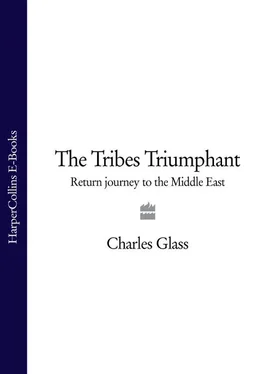Bassam had an acquaintance, also from Kerak, who knew the king. The Kerak man was a soldier, who had trained the then Prince Abdallah years before in some aspect or another of military practice. Bassam contacted the soldier – by telephone or letter, I was not sure which – and asked him to tell the king what happened to royal decisions in Aqaba. The king had to be informed that, despite his ruling to the contrary, the tables and chairs remained locked away and Aqaba’s finest garden café was empty. The soldier promised to bring the matter to King Abdallah’s attention. Further days, then weeks, passed without action from the palace or a call from the soldier. With business suffering, Bassam called Amman, the capital and home of the officer who had been a mentor to the young prince before he became the king, to impress upon his Kerak compatriot the urgency of the case. If his tables and chairs were not restored soon, the café would close and Bassam would return to Kerak a failed man. His disgrace would not fail to dishonour King Abdallah, whose writ would be seen not to run as far as Aqaba, as well as the officer from Kerak.
While I listened to Bassam’s tale, told in a tranquil voice without rancour, and puffed my narghile, I imagined the dilemma of the officer in Amman. As at all royal courts, the man would have to await the right moment – perhaps when the monarch and his courtiers were talking about Aqaba or the people of Kerak or coffee or even tables and chairs. Such moments do not present themselves every day, yet his fellow son of Kerak was calling every day from Aqaba to demand justice. A man had to be careful when making requests of a king, but the same man had to protect his reputation among the people of Kerak. Months later, when Bassam had to consider bankruptcy and admitting to all in Kerak that his king and his Kerak intercessor had both failed him, King Abdallah was made aware of the insubordination of the assiduous bureaucrat in Aqaba. The fresh decision and its implementation were immediate, and, in Bassam’s view, just: the bureaucrat was transferred to a desolate corner of the northern desert and eight tables and thirty-two chairs were delivered from the state warehouse to Bassam’s garden. He was back in business.
The tobacco was burning down and the coals had turned to ash. Several empty coffee cups and tea glasses had collected on the table. Bassam told the waiter to bring a last tea before he went home. I tried to pay him for the coffee, the tea and the narghile, but he would not accept anything. All he allowed me to do, when the table was cleared and the kiosk locked, was tip the waiter. It was after midnight when I walked along the shore to the hotel. The Red Sea, as still as the open eye of a corpse, caught the lights of four countries within a compass of forty miles. The map lines made no impression on the night. Aqaba was the reason for the lines, the frontiers, the divisions. Aqaba had been the goal of a revolt against an empire on behalf, not of the rebels themselves, but of more distant empires. The fall of Aqaba was a romantic, cynical saga, that had bequeathed a century of separation, of exodus, of bloodshed. The Turks could not hold Aqaba and, with it, the rest of what had been Greater Syria. Those who conquered it, occupied and divided it, had yet to destroy and remake it wholly in their image. Bassam did not take my money for the coffee and tobacco, and he sent what he had to his father in Kerak. This was no way to run a Starbuck’s.
When the Arabs realized that France, Britain and Zionism were claiming sovereignty over them after 1918, they resisted, longer perhaps than any other colonized population. And they were still holding out. In small ways, their lives could not conform to the standards set for them by the empires – first Britain’s and France’s, then America’s – because they ate with their hands from a shared bowl, because they took time to brew coffee and prepare their tobacco, because desert traditions of hospitality and vengeance survived in their city houses, because they believed in angels. The Western world had destroyed the mass forms of their protest – their nationalism, their socialism – and was even then bombing its latest manifestation: fundamentalist, violent Islam. Standing on ruins the Greeks had left more than two millennia before, I looked at the shores of Egypt and what are now called Israel, Jordan and Saudi Arabia. This land was indigestible. Its history was too long, its cultures too strong, its faiths too pervasive. The cost of their stubbornness has been high, but they go on paying. They have absorbed the good and the bad of civilizations that have passed here, but they have not been absorbed. They are the world’s spoilers. Imperial histories chronicle expedition after expedition – by Pharaoh, by Titus, by the Shahs of Persia, by the legions of Byzantium, by Sultans in Cairo and Istanbul, by the British army and the American armed forces – to suppress their rebellions, contain their passions and possess their wealth. Perhaps that was why I had returned, not out of pity, but in admiration.
‘Here is a land blessed more than most with health and
fertility, but its health has been paralysed by its danger,
its fertility checked and blasted by the floods and
barbarism to which it lies exposed.’
REVEREND GEORGE ADAM SMITH
The Historical Geography of the Holy Land (1894)
LAWRENCE’S FORCES rode north from Aqaba to disrupt Turkey’s railway communications and to guard Allenby’s right as his Egyptian Expeditionary Force advanced from Gaza. Eighty-four years later, I followed the Arabs’ route in an old Toyota taxi through canyon and desert. In the gorges above Aqaba, not a plant grew in the granite. Fertility lay miles north, where Lawrence feared the peasants would resist his Arab national army as they would a Bedouin raiding party. Centuries of Bedouin raids – sheep theft was as common as on the Scottish – English borders – had made the fellaheen wary. Some attacked their liberators. A half-hour out of Aqaba, a customs officer stopped us at an anti-smuggling roadblock. When the driver told him I was a foreigner, he let us pass the Jordanians whose cars were searched.
One by one, sprigs of life exposed themselves beside the road: sage, an acacia, a donkey. The first work of man was a stone monument, left for centuries in the wind to revert to bare stone. Then, evidence of civilization: a cemetery within walls of grey rock housed a regiment of marble markers. Next to it, a village of newly painted old mud and new cement breeze-block houses, all but a few single-storey, sheltered a population half that of the graveyard.
On the right, parallel to the road, a railway line accompanied us north. The track had, until Lawrence, carried pilgrims, soldiers and supplies from Istanbul all the way to Mecca. Perhaps the peasants had been right to oppose Lawrence’s desert Arabs. Thanks to Lawrence, the Hejaz railway never ran again. In Damascus, there remained a beautiful Ottoman Hejaz Railway Station and a modern Hejaz Railway Commission whose members – Turkey, Syria, Jordan and Saudi Arabia – distrusted one another so much that not one mile of the track blown by Lawrence’s sappers had been repaired. Like Arab unity, rebuilding the railway was relegated to the realm of millinerian expectation.
The modern era’s power pylons, telephone poles and water pipes defaced the landscape. At noon, we reached a sign that read ‘Amman, 275 Kilometres’. Another sign advertised ‘The Farm for Sale’. The car stopped, and I looked from a ridge across the sands for the farm. Nothing grew for a hundred miles. I understood why the farmer wanted to sell, but where would he find a buyer? The drought that parched his land could not be blamed on global warming. It began at the end of the Ice Age.
Читать дальше












